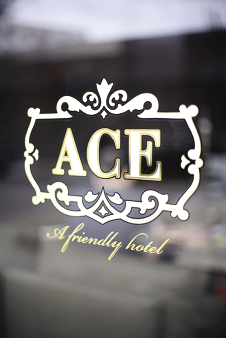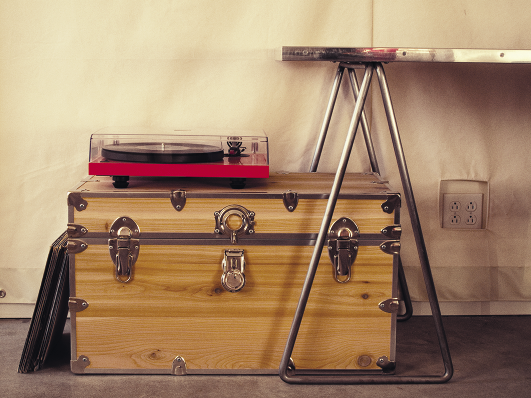- Home
- Media Kit
- Current Issue
- Past Issues
- Ad Specs-Submission
- Ad Print Settings
- Reprints (PDF)
- Photo Specifications (PDF)
- Contact Us

![]()
ONLINE

An Inclusive Brand
Editors’ Note
Brad Wilson is President and co-Partner of Atelier Ace. His first jobs in hospitality were with Hilton International, Park Hyatt, and Westin. He was recruited to launch the first W Hotel and helped guide the fledgling Starwood brand’s early days, rising to Vice President of Operations for W Worldwide. From there, he helped build James Hotels from the ground up, serving as CEO. Wilson attended Cornell University’s School of Hotel Administration.
Company Brief
Ace Hotel Group (acehotel.com) is a branded operating company that re-envisions the traditional hotel model, enhancing the value of properties through an innovative and locally inspired approach to design and development. Through custom-tailored branding, design, and programming, Ace brings new life to challenged properties in emerging locations and seamless integration to new construction. They tap into the authentic voice of a property or location, with an emphasis on narrative and visual identity, maximizing the value of unique real estate. They utilize creative upgrades and non-traditional platforms to acquire alternative revenue streams, such as highly curated retail programming and food & beverage events programming. Their in-house design, marketing, digital, and PR team Atelier Ace generates and grows the creative voice and experience trademark to all current and future Ace Hotels and satellite brands and projects.

The Ace logo
Would you talk about the creation of the company and how it has evolved to where it is today?
Ace Hotels was started when our founder and a couple of buddies decided to create a hotel that they would want to hang out at. In a lot of ways, that early start is the root and the value of what we do.
Alex’s (Calderwood, Founder) vision at that point was to make something authentic and true, and something that he loved and knew people would love.
Who is the Ace client?
This is at times one of the most misunderstood ideas. We always hear that our client is the new millennial and there are a few of those. However, the core concept when Ace was started – and that still exists today – is to be a very inclusive brand. We’re looking to make something that is authentic and real, and that relates to people who are intellectually curious and who care about culture in their destination. We see a very broad demographic that’s anywhere from age 20 to age 60.
Alex used to say that he saw the clientele as the high and the low card in the deck. So our hotels are designed to accommodate the CEO of a major online company as well as the millennial kid with a backpack. We’re broad in our coverage.

Creative room amenities from Ace
Are there key traits that identify an Ace Hotel?
All of our hotels are bespoke. We have essentially the exact opposite of a chain. We are a brand, but as we see it, the brand isn’t a sign; the brand is, more than anything else, the emotional connection among our hotels. There is a romantic, soulful theme that runs throughout all of the hotels – an understanding of culture and a cultural connection that’s common among all properties. People know they’re in an Ace, but it’s a mood and emotional link more than anything else – it’s not a book of standards.
It’s handmade and tailored specifically for its location – not just the city but the neighborhood within that city.
Are you in the markets today that you need to be in? How much growth opportunity is there?
We’re in London, New York, and Los Angeles, so we have some global city distribution on that side. We’re also in interesting secondary cities like Seattle and Portland, but also Palm Springs, where we have been incredibly successful. We’re now in the process of opening a hotel in Pittsburgh, which isn’t necessarily where the big guys are going but it’s an amazing little city and has its own opportunity to be reinvented.
Do people understand that you can have a great vibe and comfort level and still get great service?
People who have stayed with us do and that’s been the topic of some of the strongest feedback we’ve gotten. We’ve always been a collaborative company so our approach to people has always been that everyone who joins us brings something to the table.
We have a very inclusive and empowering environment. In turn, a lot of our service extends beyond what you see in other hotels, because people care. We have a really high level of skill because the brand attracts very intelligent people who are interested in the cultural connections, and that makes that service model easier. We encourage people to think and solve problems on their own, and to look at every issue as an opportunity to find a new solution. We changed the hotel industry in that sense because we’re always looking at how things were done and how to do them differently, and we encourage that thinking all the way to the front desk.
We try to keep that thinking alive in everything we do and we find that creates really good service.
Also, our people look at guests not as guests but also as people, so we keep everything real that way. In the end, if you think of the other person as someone with a real need, then you’re going to serve that person well.
One of our big challenges is that there is not a great name for what we do. Since we’re different from everybody else, we automatically get put into the boutique hotel group. In some ways, we’re like the exact opposite of a boutique hotel. When you think of the boutique hotel, you think of a hotel that is exclusive and sexy. Maybe we’re nerds compared to that. We’ve never been the nightclub operators – we’re thought people.
We’re actually nice and that comes through in the hotels. This is sometimes different than what people are trying to project in more typical boutique hotels where they want the velvet rope and a sense of exclusivity.
With such a range of guests, how far have you gone with the technology?
Some people accuse us of being more analog than digital, and that might be a healthy thing.
We do, however, leverage technology everywhere and we have a very tech-savvy team here. In a lot of ways, we have been ahead of everybody else in technology.
The difference is that we don’t put that in the forefront. We’d rather have people-to-people communication. We’re there where you should have all of the options, but we’re adamant that a guest should have the option to use the technology but should always experience the human touch. That’s the part that we will always stick to. Relationships are built from that human interaction – not from touching a button.•